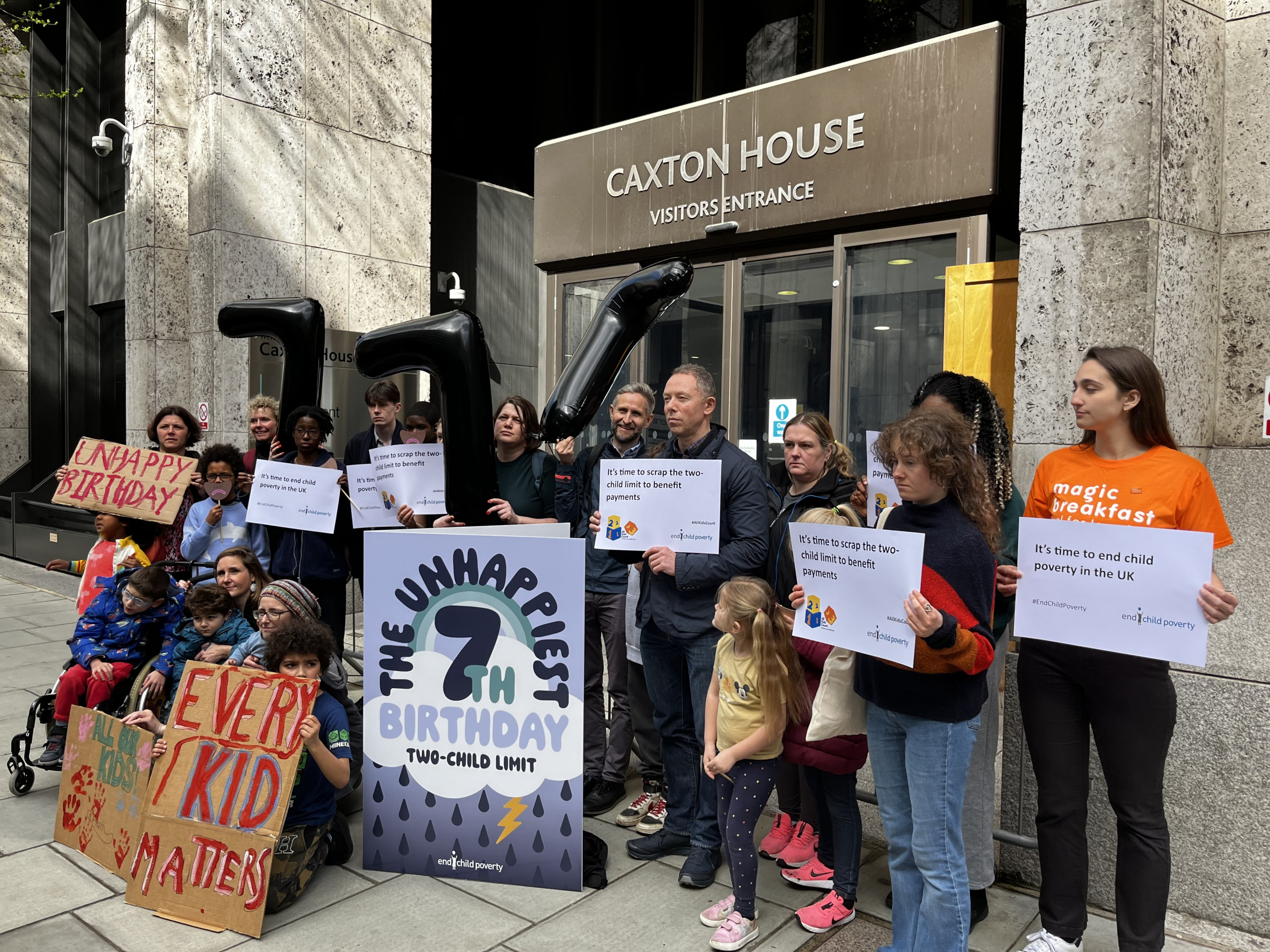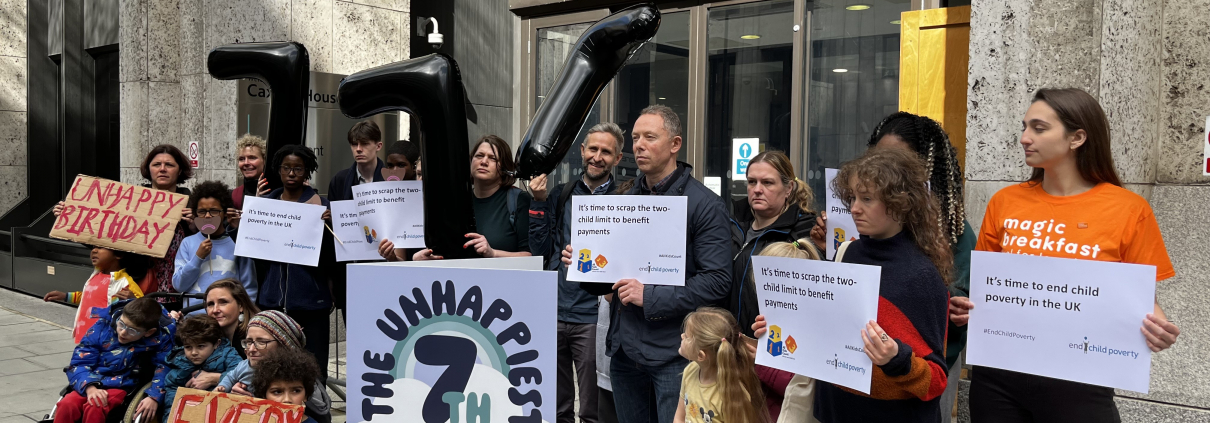The Unhappiest of Birthdays: 7 years of the two-child limit
Tomorrow (Saturday 6th April 2024) is the 7 year anniversary of the two child limit to benefit payments. So today we took a message to the Department for Work an pensions that couldn’t be ignored – a giant unhappy birthday card. Along with a letter for the Rt Hon Mel Stride MP, the Secretary of State for Work and Pensions. 
Read our letter below
Dear Secretary of State
Tomorrow marks a very unhappy birthday, the 7th anniversary of the implementation of the two-child limit to benefit payments. To mark this occasion, we are presenting you with this unhappy birthday card – to demonstrate how this is a birthday we, the End Child Poverty Coalition, will never celebrate.
The End Child Poverty Coalition is made up of over 110 organisations including child welfare groups, social justice groups, faith groups, trade unions and others. Together with a group of Youth Ambassadors, who have personal experience of living in a low-income situation, we all believe that no child growing up in the UK should live in poverty.
1 in 10 children in the UK today is growing up in a household whose benefit payments are reduced by the two-child limit.[1] Our own research has shown every UK constituency is now home to families impacted by this policy. But there is widespread variation across the country – in some constituencies the rate is as high as 3 in 10 children living in a household which is affected by this limit to benefit payments. 89 parliamentary constituencies have at least 15% of all children living in a family which is subject to the two-child limit. 333 constituencies have 10% or more, of all children, living in a household which is impacted by this policy. This is just over half of the 650 constituencies across the UK. This research also demonstrated that there is a strong positive correlation between constituencies most affected by the two-child limit and those with the highest child poverty rates. [2]
The two-child limit is a policy which is pulling larger families into poverty. The recent Households Below Average income data release showed that 46% of children living in families with three or more children are living in poverty. Whilst 22% of children living in a family without other children are in poverty.[3]
Many families could have planned to support more than two children through work alone, but for many reasons including a family break up, death of a partner, losing a job and the cost-of-living crisis – are no longer able to meet the financial requirements of providing for their family without support. Yet sadly our benefits system is not set up to catch these families when they fall.
We know that one of the justifications used for imposing this policy on the poorest families is that this is meant to ensure those receiving benefit payments “face the same financial choices about having children as those supporting themselves solely through work”.[4] However, 59% of families who have their benefit payments reduced as a result of this limit, have at least one family member who is in work.[5] Plus, this policy is applied to groups, who under other Universal Credit requirements are not required to work – such as households where one parent already works and the other is taking care of a child under the age of three. Or where there is a single parent taking care of a child under three.
We also understand from recent answers to Parliamentary Questions that the government has made no assessment of whether the two-child limit is meeting its policy objectives.[6] That no assessment has been made of barriers to work for those impacted by the policy.[7] That no assessment has been made of potential correlation between the two-child limit and levels of child poverty[8] and that the government has not made any estimate of how many children will be affected by the policy in future years.[9]
Scrapping the two-child limit would lift 300,000 children out of poverty and mean 800,000 children are in less deep poverty, at a cost of £1.8 billion – making a significant difference to the lives of more than a million children.[10]
Today, outside of the Department for Work and Pensions building we read aloud the words from Rosie, a single mother to three children who has her benefit payments reduced by the two-child limit. We would like to leave you with her words:
“My third child is about to turn 7 years old. He is as old as this policy, one of the first children to be born who was impacted by this. And for all of his life, for seven whole years, it feels as if he is invisible to those who make decisions about benefit payments. People who make decisions in buildings like the one behind us, removed from the real lives of people like me and so many others I know. It feels to me that my son’s needs do not matter.
“Sadly, this is not just how I feel but I am sure I speak for the millions of parents, and in turn their children, who are impacted by the two-child limit to benefit payments. Why are our children invisible to you?”
We hope that on this unhappy 7th birthday you will do the right thing and scrap the two-child limit to benefit payments immediately.
Yours sincerely,
Joseph Howes, Chair of the End Child Poverty Coalition and CEO of Buttle UK
Darcy, aged 17 signing on behalf of the End Child Poverty Coalition Youth Ambassadors
[1] From https://www.gov.uk/government/statistics/universal-credit-and-child-tax-credit-claimants-statistics-related-to-the-policy-to-provide-support-for-a-maximum-of-2-children-april-2023/universal-credit-and-child-tax-credit-claimants-statistics-related-to-the-policy-to-provide-support-for-a-maximum-of-two-children-april-2023
[2] From https://endchildpoverty.org.uk/two_child_limit/
[3] From https://www.gov.uk/government/statistics/households-below-average-income-for-financial-years-ending-1995-to-2023
[4] From https://commonslibrary.parliament.uk/research-briefings/cbp-9301/
[5] From https://www.gov.uk/government/statistics/universal-credit-and-child-tax-credit-claimants-statistics-related-to-the-policy-to-provide-support-for-a-maximum-of-2-children-april-2023/universal-credit-and-child-tax-credit-claimants-statistics-related-to-the-policy-to-provide-support-for-a-maximum-of-two-children-april-2023
[6] From https://questions-statements.parliament.uk/written-questions/detail/2023-12-07/5913
[7] From https://questions-statements.parliament.uk/written-questions/detail/2023-12-07/5912
[8] From https://questions-statements.parliament.uk/written-questions/detail/2023-12-06/5588
[9] From https://questions-statements.parliament.uk/written-questions/detail/2023-12-06/5587
[10] From https://cpag.org.uk/sites/default/files/2024-02/CPAG_pre-Budget_MP_briefing_0.pdf



 Jonathan Hyams/ Save the Children
Jonathan Hyams/ Save the Children